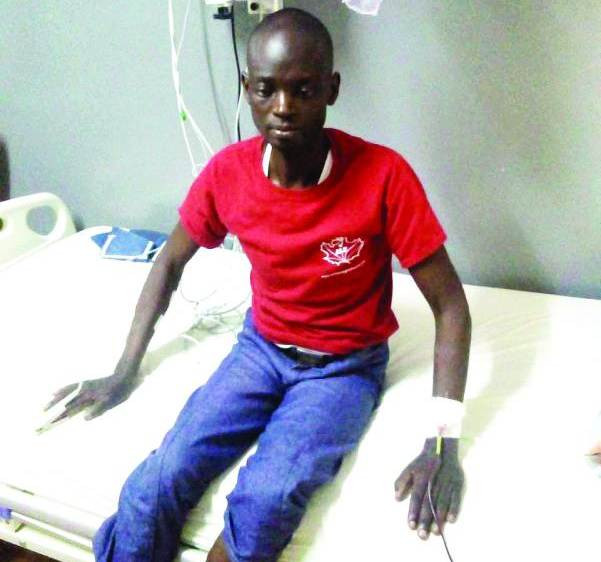He is a female reproductive health advocate and specialist at 28. JUNIOR MUKUDI explains how sexual abuse from househelps as a child led him into this career and things ‘south’ that women need to know.
You describe yourself as a health systems specialist and women health advocate. What did you study?
I have a background in psychology, nursing and health systems management (diagnosing common women’s health issues using radiological procedures) and later was interested to do a woman’s health course.
Did your upbringing contribute to your career path?
Yes, my upbringing led to my career path. I was brought up in a good family, but there was an instance where a house help assaulted me sexually. She used to “play” with my penis. I was only able to tell my mother when I was around 11-12 years old. Later we had another house help who kept nagging me to have sex with her. Then when I was around 14 years when I was coming back from school, there’s this woman I knew who dragged me into bushes beside the road and attempted to assault me sexually. Fortunately, I overpowered her and fled. These incidences motivated me to study psychology and women’s health because I wanted to know what is it about women.
Many male medics pursue women reproductive health. Why?
I would say it's basically passion for women, mothers, babies and the whole process of bringing life forth. But the old wives tale is that opposites attract.
What are some of the most common cases you deal with from women?
Infertility, sexually transmitted infections, sexual abuse and emotional abuse. Sometimes, they come and they say I have been having this discharge, I feel pain during intercourse, others miscarriages, and so forth.
What are some of the most common reproductive issues that women do not know about?
Modes of contraception, this affects all ages. Another thing is handling common infections (pelvic inflammatory disease, UTI, chlamydia) majorly reproductive health issues and infertility.
Are women usually accompanied by their partners during consultation?
Yes and no.
Those that work toward fertility come with their spouses, others don’t. Most come with their spouses when there’s a reproductive issue.
Mostly, couples who are in stable marriages usually come together but also mostly when there are reproductive issues.
As an expert, sometimes, it is better for the woman to come alone as sometimes clients do not open up when the partner is there.
I believe knowledge about sexual health is very important, because most cases come from a point of lack of information.
When should a woman go for checkup?
As early as they can. When they’re sexually active or have irregular menses or just any reproductive issues. For a woman over 30 it is important to check reproductive systems, to check for fibroids etc. In case there are challenges they can get help from the experts.
How do you make a first-time patient comfortable during consultation?
It’s about creating a good environment and giving them adequate knowledge in relation to their concerns and being empathetic. They are mostly concerned about my age, saying I am very young, but once I assure them about my credibility they get comfortable.
Do women come for routine checkups or do they wait until they are experiencing some discomfort?
I would say some come and some don’t, we expect different kinds of patients. But in my experience, women who are educated or exposed tend to walk in for regular checkups. This is highly recommended.
Does menopause mean one doesn’t need routine gynaecological checks?
Not at all, in fact, routine check-ups are encouraged, at least once a year or every three years when a woman has low-risk factors. Some irregularities in some examinations and checkups may warrant frequent visits.
Do you get male patients?
Yes I do. Most of the cases I get are sexually transmitted infections, erectile dysfunctions, addiction to masturbation or testicle problems.
What are some of the trickiest issues you deal with?
There are women who make sexual advances at male doctors, so most of the time, I ensure to have a nurse in the room. Another challenge is solving family issues, especially if a sexually transmitted infection is involved or where conflicts arise over a baby’s gender. So I have to counsel them, that is where my psychology training comes in.
How would you advise women who perfume their vaginas, douching and inserting garlic?
While there is information on douching and its safety practices, I don’t advise it because it disrupts the balance of bacteria in the vagina and can alter the normal PH of the vagina This causes a lot of problems including problems of getting pregnant and also cause infections and it’s spread. Douching is useless as the vagina and cervix have glands that secrete to clean itself.
At what age should parents have their daughters see a gynaecologist and why?
Age 13 to 15. At this age, it’s good for the girls to know about their development and make them comfortable to share their personal information in future. Remember, some girls may also be sexually active or facing problems with their periods.
Infertility among women, what should women do to avoid this
Mostly, they should maintain a healthy weight because over and underweight women are at increased risk of ovulation disorders while increased exercise has been associated with decreased ovulation. Smoking is also no good because it affects fertility and both the health of the mother and fetus. Heavy alcohol consumption also decreases fertility and affects the developing fetus. I also advise young women to avoid stress.
 The Standard Group Plc is a multi-media organization with investments in media platforms spanning newspaper print
operations, television, radio broadcasting, digital and online services. The Standard Group is recognized as a
leading multi-media house in Kenya with a key influence in matters of national and international interest.
The Standard Group Plc is a multi-media organization with investments in media platforms spanning newspaper print
operations, television, radio broadcasting, digital and online services. The Standard Group is recognized as a
leading multi-media house in Kenya with a key influence in matters of national and international interest.











